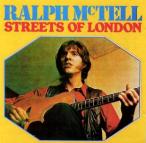Many people have turned down other people’s song, but few turn down their own song. Often it’s because they don’t have enough faith in it like country singer Eddie Miller who, in 1946, wrote a song called Release Me. He spent four years touting his song to various artists who all turned it down. He re-recorded it no less than five times but still had no luck getting someone to sing it, so eventually he recorded it himself and scored a big country hit. Twenty one years later Engelbert Humperdinck took the song to number one in the UK chart and made it a million seller.
Ralph McTell is most famous in the UK for his one and only hit Streets Of London, but he very nearly didn’t have a hit with it. In 1966 the Croydon-born singer/songwriter, then called Ralph May, having spent a few years busking on the streets of Europe began, whilst in Paris, writing a song called Streets of Paris for his forthcoming debut album Eight Frames A Second. It was based on his experiences of hitchhiking and busking around Europe. The song addresses many of the everyday sights you would see in a big city, homelessness, elderly people, lonely people and various odd members of society.
A couple of years later and realising the title didn’t really work he changed the title to Streets of London which are not all references from London, but from his home town of Croydon as Ralph explained, “Three of the characters in the song are Croydon characters, for example, there was no Seaman’s Mission in Croydon, but there was a working man’s hostel, but working man’s hostel doesn’t scan terribly well, but people come up to me and say, ‘I’ve seen that place, I know that place and they seem to know all the characters and when the song is translated to other languages, they just change the city.” The hostel is in Mitcham Road and the opening line ‘Have you seen the old man In the closed-down market’ is a reference to Surrey Street market. The all-night cafe is Mick’s cafe on Fleet Street.
Ralph first recorded it in 1969 and then explained what happened next, “I offered it to a professional singer on the circuit and he thought it was a bit sad so I thought maybe it is. But it was dear {producer} Gus Dudgeon, who had produced my first two albums, who persuaded me to record it and add it as the very last track on my second album, Spiral Staircase.” He re-recorded the song for a single that made the Dutch chart in 1972 and re-recorded it yet again for the version that made the UK chart in 1974.
Ralph only recently learned that he was named Ralph after the classical composer Ralph Vaughan-Williams. He was impressed and said, “It was my rather wayward dad who once did a gardening job at Ralph’s house and loved the name. I took my surname from the bluesman Blind Willie McTell. When I was a kid I was obsessed with the guitar and was particularly interested in black American finger-style blues guitar. There was an LP that came out in the early 60s which had a track on it called Statesboro Blues played on a 12-string guitar and I just had to get a 12-string and I became known as the bloke who played the Willie McTell song so it was a natural progression to change my name.”
In 2011, Ralph is back with a new album called Songs For 6-strings and starts a tour on September 27th which runs until 11 December. For more information, click here. http://www.ralphmctell.co.uk/tour.php
